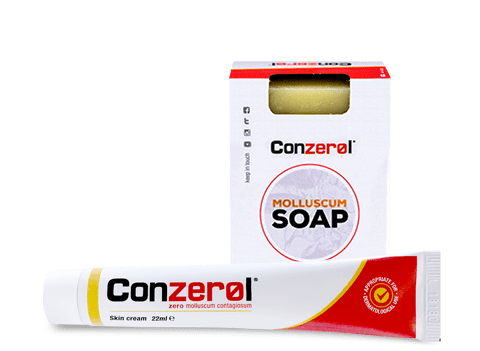
5 Commonly Confused Skin Diseases
Millions of Britons are affected by common skin diseases each year. Although such disorders are widespread, many people are unsure of how to determine the type of infection they have or how best to treat their blemishes. Is this molluscum contagiosum?
Skin lesions and rashes can be harmless and readily treated or they can be more concerning and demand quick medical attention to resolve. Knowing the symptoms of some of the more common disorders will help you seek out the best care for your condition. Here are five of the most prevalent skin diseases:
- Rosacea: As its name suggests, Rosacea causes rosy red patches to appear on the skin of the face. In some cases, small, firm bumps are present along with the unusual degree of redness. While both men and women can exhibit rosacea, it is typically diagnosed in middle-aged women. Rosacea can be worsened by diverse factors such as high temperatures, sun exposure, and stress, but a single cause has yet to be determined.Because symptoms of rosacea can be similar to those of acne, eczema or psoriasis, it is recommended that a doctor review your health history and perform a physical examination to accurately diagnose this condition. Several treatment options have been employed with some success. The redness and bumps may be minimized with the use of antibiotics and medication. Advanced cases of rosacea in which the deeper blood vessels are involved may benefit from surgical methods to reduce the visibility of the inflamed vessels.
- Eczema: If your skin is red, itchy and irritated with flaky or scaly patches, you may have eczema. Symptoms of this disorder may cycle from high levels of discomfort, inflammation and itching to relatively quiet periods of minimal negative impact. It is believed that eczema can be caused by a combination of environmental triggers and genetics. While uncomfortable, the disease is not contagious. A doctor can diagnose this condition by examining the affected areas, and while there is no cure for eczema, your doctor can help you manage the symptoms with topical treatments.
- Psoriasis: Another common skin disorder characterized by itchy, red, scaly areas is psoriasis. This disease typically affects the thicker skin found on elbows, knees, and the soles of the feet. Psoriasis is a chronic condition similar to eczema, and though there is no cure, there are options available to help patients manage their symptoms. It is thought that psoriasis has some connection to the immune system, as stress, cold weather, and common infections can aggravate the condition. Due to its similarity with conditions like eczema, diagnosis is sometimes confirmed via biopsy. Treatments for this disorder can include oral medication as well as topical creams such as retinoids.
- Warts: Warts are characterized by small, rough textured lumps that often appear on the hands and fingers. Unlike some skin disorders, warts are caused by a virus and are easily spread between people. Adults and children are susceptible to warts at any time, particularly if they have a depressed immune response. If the bump on your skin is peppered with tiny black dots, it is likely that it is a wart. It is best to have a doctor confirm the presence of the wart; they may use a biopsy to rule out other skin diseases. While a wart can eventually disappear of its own accord, it can linger for quite some time. Quicker treatments include freezing the bumps off with liquid nitrogen or using acid treatments to eat away at the extra tissue.
- Molluscum Contagiosum: Another common skin disease characterized by red bumps or lesions on the skin is molluscum contagiosum. Children are often affected by this disease, and because it is extremely contagious, they readily infect others. The lumps are prone to irritation and can appear anywhere on the body, possibly causing embarrassment about your appearance. A doctor can usually diagnose molluscum contagiosum by visual examination, but if there is any doubt, they will often confirm the presence of the virus by biopsy.Like warts, this disease can resolve on its own, but the unaided healing process can span months or evenyears. The infected person will be highly contagious until all lesions are gone, and doctors suggest treatment to speed the elimination of the virus and reduce the likelihood of spreading it to others. There are surgical approaches to treatment which may be painful or cause some amount of scarring or skin discoloration. A topical solution is Conzerol®, an easy to apply cream. Used as instructed, it may ease the bumps/lesions in as little as 7-12 days.
 It can be difficult to distinguish between common skin disorders. In the case of highly contagious, viral skin diseases like molluscum contagiosum, delayed diagnosis can lead more people to be infected. Learning to recognize the appearance and symptoms of common diseases will allow you to seek the appropriate diagnosis and solution in a timely fashion. Prompt care can help you manage and treat your skin problems so you can get on with your life.
It can be difficult to distinguish between common skin disorders. In the case of highly contagious, viral skin diseases like molluscum contagiosum, delayed diagnosis can lead more people to be infected. Learning to recognize the appearance and symptoms of common diseases will allow you to seek the appropriate diagnosis and solution in a timely fashion. Prompt care can help you manage and treat your skin problems so you can get on with your life.
If you are experiencing redness, bumps, or rashes on your skin, please contact your general practitioner for care. The sooner your skin condition can be diagnosed, and treated the sooner you can heal.
